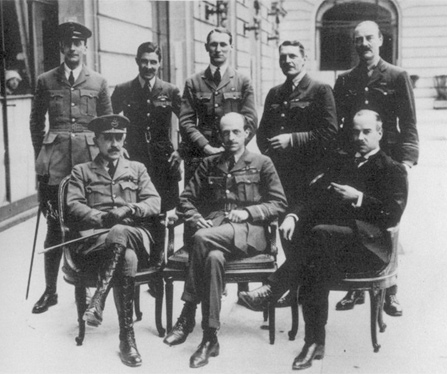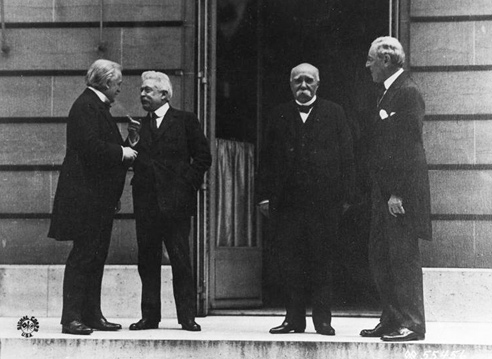
Source: British Air Section at the 1919 Paris Peace Conference, Probert, H. (1991), Wikimedia

Source: British Air Section at the 1919 Paris Peace Conference, Probert, H. (1991), Wikimedia
The Paris Peace Conference of January 12, 1919, brought together the victors of World War I - France, Great Britain, the United States, and Italy. The victorious nations met at the palace at Versailles, just outside of Paris, France, to discuss the fate of Germany and Austria-Hungary. Each nation brought a set of beliefs and attitudes about what should be done. The actual conference lasted a year (officially ended Jan. 20, 1920).
Below is a summary of the attitudes of the major nations involved in the Treaty of Versailles.
What should be in the treaty??
| Attitudes towards Germany during the Paris Peace Conference | |
| Britain |
|
| France |
|
| USA |
|
Table adapted from the National Archives of the United Kingdom

Source: Council of Four Versailles, Capt. Jackson, US Army Signal Corps, Wikimedia
The actual treaty
In May of 1919, the Treaty of Versailles was completed. Germany had not been invited to the Paris Peace Conference and waited anxiously for the results. Would they be treated fairly? Would the victorious nations give out harsh punishments? Here's what was decided:
![]() You have learned about the goals of the victorious nations (United States, Great Britain, and France) and the terms of the Treaty of Versailles. In the columns below, CLICK whether or not you believe the terms of the treaty were fair or unfair to Germany. What are your column totals?
You have learned about the goals of the victorious nations (United States, Great Britain, and France) and the terms of the Treaty of Versailles. In the columns below, CLICK whether or not you believe the terms of the treaty were fair or unfair to Germany. What are your column totals?